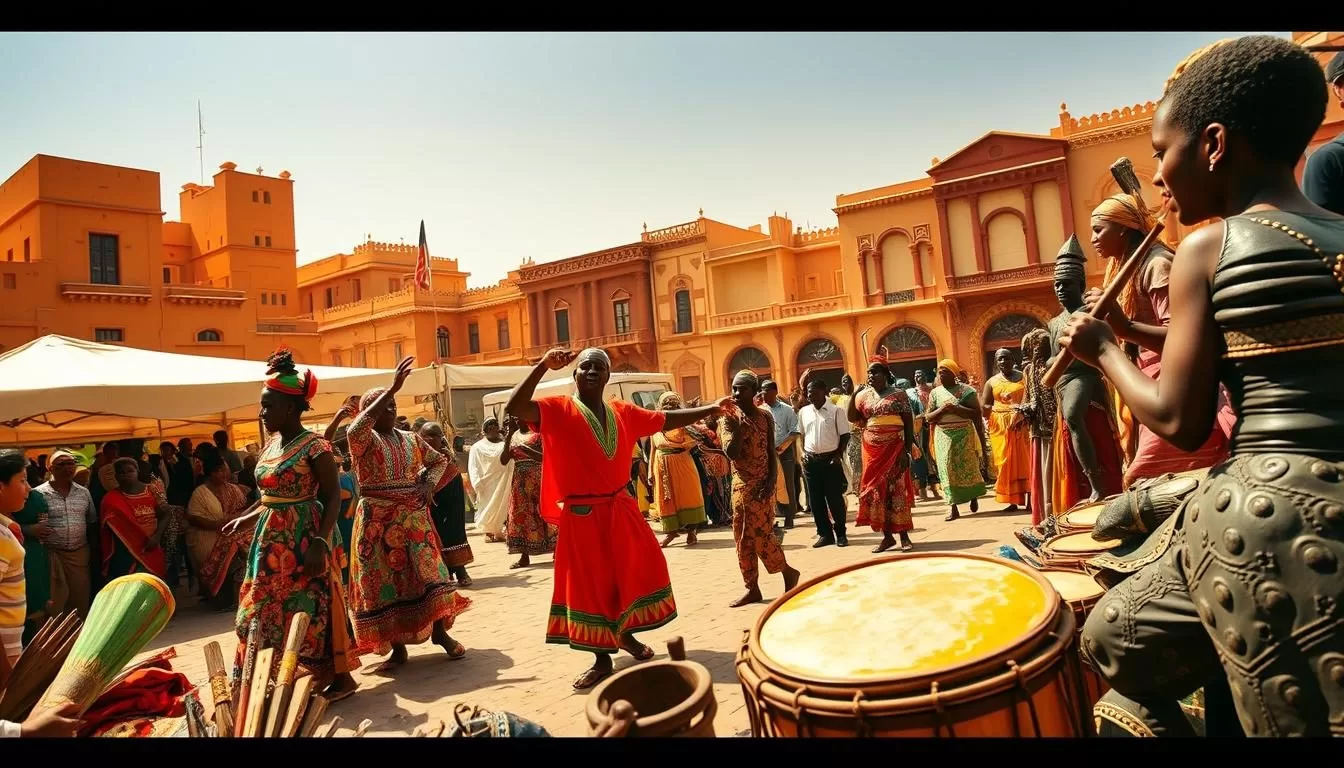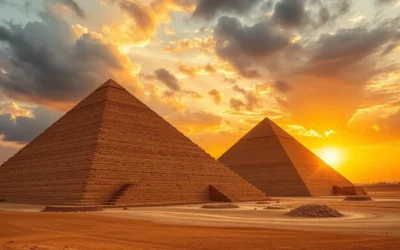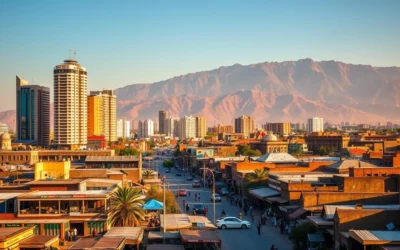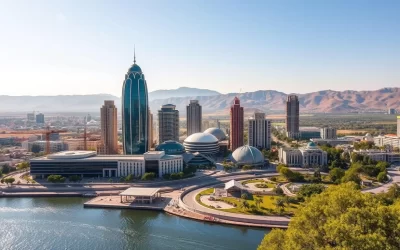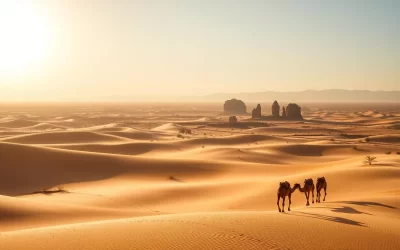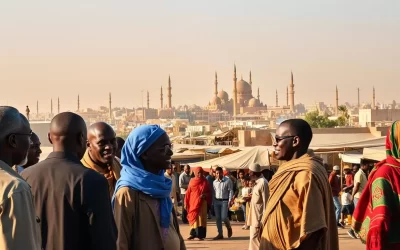✓ Accommodations✓ Flights✓ Rental Cars
As you plan your trip to this culturally rich country, you’ll discover a vibrant tapestry of cultural celebrations that reflect its complex history and identity.
festivals take place, showcasing both religious significance and culture heritage. These events are a testament to the country’s diverse influences, blending African and Arab traditions.
By experiencing these festivals at the right time, you’ll gain a deeper understanding of Sudanese society and enjoy authentic experiences that go beyond typical tourist attractions. This is your chance to witness the renowned hospitality of the Sudanese people and see how these celebrations bring communities together.
Discovering Sudan’s Rich Cultural Heritage
As you explore Sudan, you’ll uncover a rich tapestry of cultural heritage woven through its vibrant festivals. The country’s culture is a fascinating blend of traditions, shaped by its history and diverse ethnic groups.
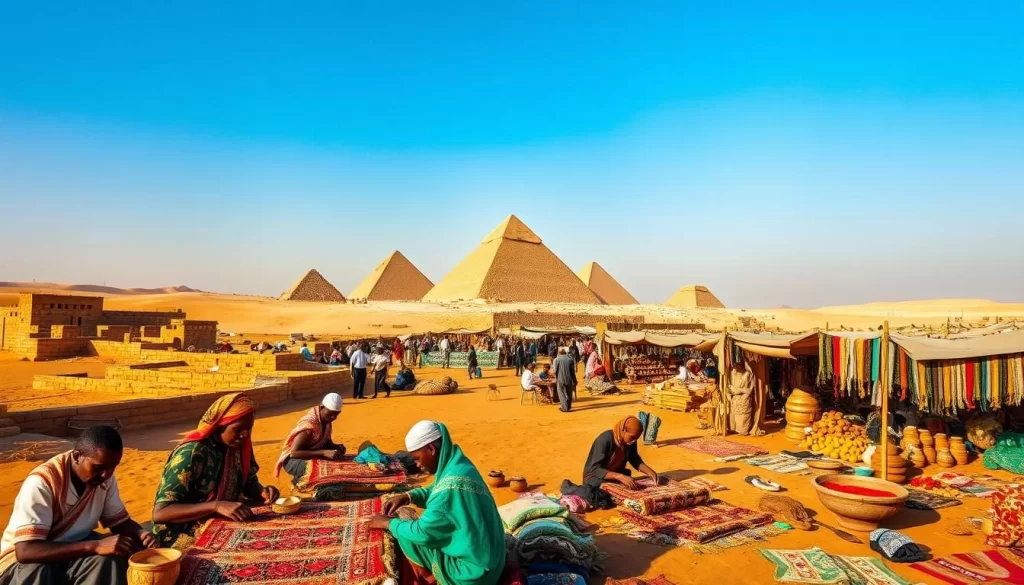
The Significance of Festivals in Sudanese Culture
Festivals in Sudan are more than just celebrations; they are a means of preserving the country’s cultural identity. These events strengthen community bonds and showcase the diversity of Sudanese traditions. By participating in these festivals, you’ll gain insight into the people’s customs and way of life.
The festivals serve as living museums, preserving traditions that date back centuries. They offer a glimpse into Sudan’s cultural evolution, from pre-colonial times to the present day.
Best Times to Visit for Festival Experiences
To experience Sudan’s vibrant festivals, time your visit correctly. The best season to visit is during the winter months, from November to February, when the climate is more temperate. This period hosts many significant festivals, providing a unique opportunity to immerse yourself in Sudanese culture.
By planning your visit around these events, you’ll maximize your exposure to authentic Sudanese traditions and create unforgettable memories.
Religious Celebrations That Define Sudan
You’ll find that Sudan’s religious festivals are not just events, but experiences that define the country’s spirit. These celebrations are deeply ingrained in the Sudanese culture, reflecting the nation’s strong faith and communal bonds.
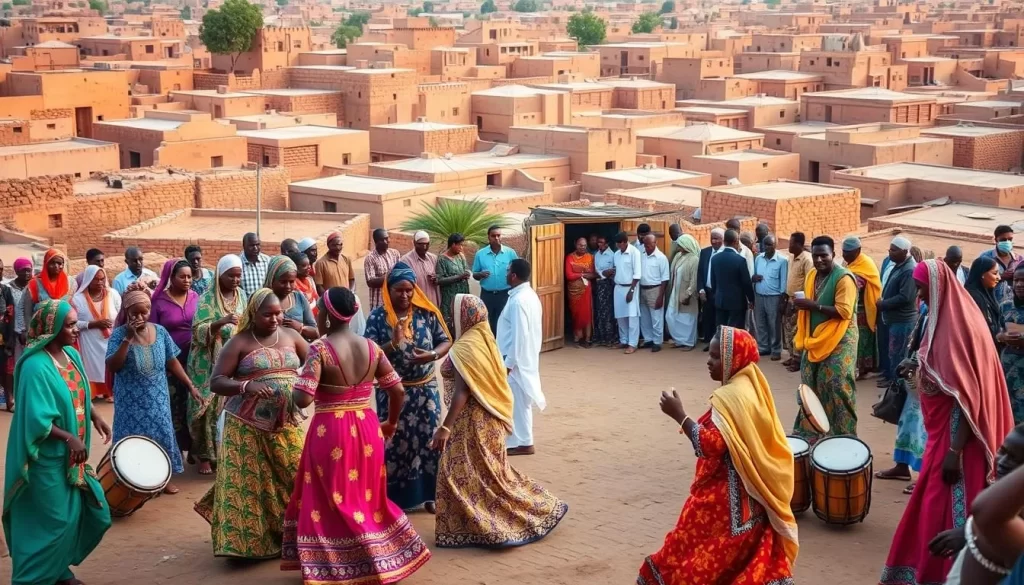
Eid al-Fitr: Celebrating the End of Ramadan
Eid al-Fitr is the most significant festival for Muslims, marking the end of Ramadan. It’s celebrated with great enthusiasm across the country, transforming city landscapes and rural villages alike with decorations, special foods, and communal prayers. Sudanese families prepare traditional dishes like kisra and mullah, strengthening family bonds during this joyous occasion.
Eid al-Adha: The Festival of Sacrifice
Eid al-Adha commemorates Prophet Ibrahim’s willingness to sacrifice his son as an act of obedience to Allah. This festival involves sacrificing an animal and distributing its meat to those in need through various charitable services. It’s a time of both religious observance and charity, highlighting the values of compassion and generosity in Sudanese society.
Mawlid an-Nabi: Honoring Prophet Muhammad’s Birth
Mawlid an-Nabi celebrates the birth of Prophet Muhammad, observed with special prayers, feasting, and cultural expressions. In Sudan, this occasion is marked with poetry recitations and processions in major city centers, blending religious devotion with cultural heritage in a vibrant display of faith and community spirit in this sacred place.
These religious celebrations not only define Sudan’s cultural identity but also bring its people together, fostering a sense of unity and shared values across the country. As you experience these festivals, you’ll gain a deeper understanding of the Sudanese way of life and the importance of faith in this beautiful place.
Sudan’s Top Festivals to Check Out When Visiting
As you explore Sudan, you’ll discover a variety of festivals that are definitely worth checking out. These events not only showcase the country’s rich cultural heritage but also provide a unique opportunity to engage with the local community.
Karmakol International Festival: A Celebration of Arts and Literature
The Karmakol International Festival is a celebration of arts and literature that takes place in the village of Karmakol, the birthplace of Altayib Salih, one of Sudan’s most celebrated writers. This festival has transformed the small village into a cultural hub, attracting artists, writers, and visitors from around the world. The event features film screenings, music performances, art exhibitions, and workshops, creating a vibrant atmosphere that honors Salih’s legacy while fostering contemporary artistic expression.
The festival’s unique setting in traditional Nubian-style houses, known as “hush,” adds to its charm. These renovated houses provide an authentic backdrop for the cultural activities, making the Karmakol International Festival a truly immersive experience. By hosting this event, the local community and the government are working together to promote cultural exchange and understanding.
| Festival Highlights | Description |
|---|---|
| Film Screenings | Showcasing local and international films |
| Music Performances | Featuring traditional and contemporary Sudanese music |
| Art Exhibitions | Displaying works by local and international artists |
Sufi Festival: Mystical Music and Dance Traditions
The Sufi Festival is another significant event in Sudan’s cultural calendar, celebrating Sufi saints through colorful processions, music, and dance. Held usually in November, this festival is a testament to Sudan’s rich spiritual heritage. The event features hypnotic music performances and whirling dervishes, creating a mesmerizing spectacle that showcases the country’s mystical Islamic traditions.
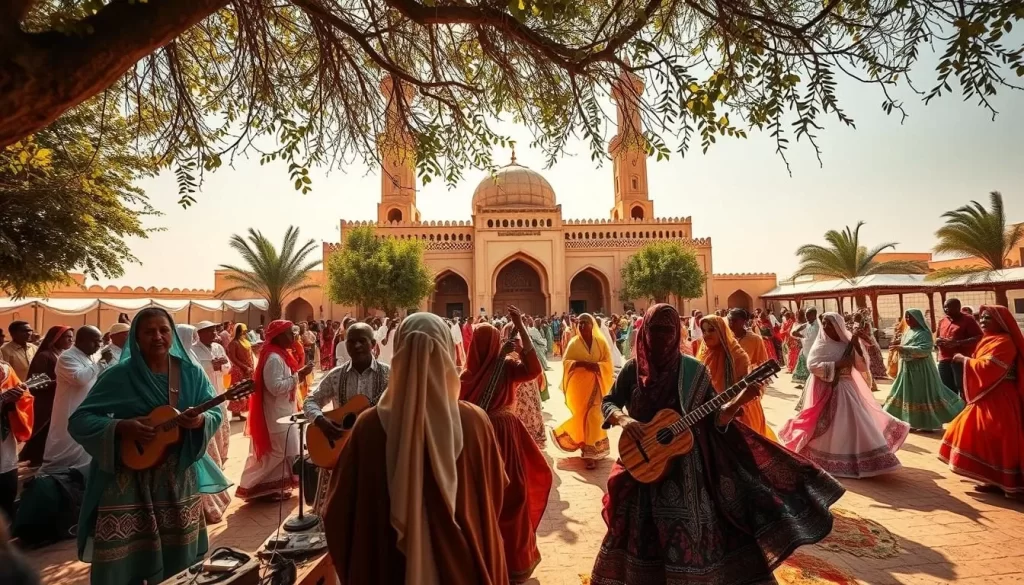
The Sufi Festival provides a rare opportunity for cultural exchange between urban intellectuals, international visitors, and rural communities. By coming together to celebrate their shared heritage, the people of Sudan foster social cohesion and promote a deeper understanding of their traditions.
National Celebrations and Patriotic Events
National celebrations in Sudan are a testament to the country’s journey towards independence and its complex post-independence history. These events are crucial in understanding the country’s identity and its people’s sense of unity.
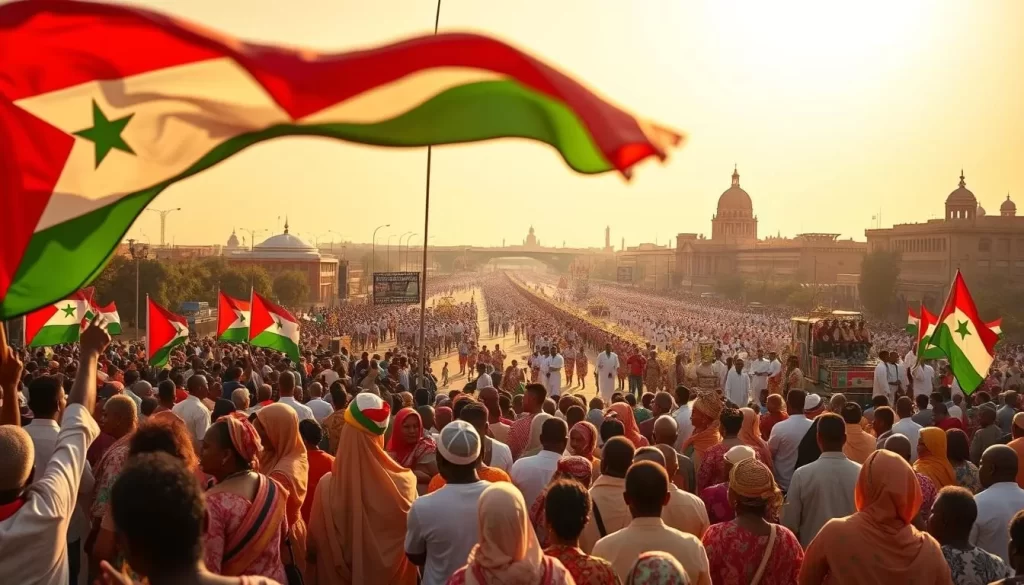
Independence Day: January 1st Festivities
Independence Day, celebrated on January 1st, marks the day Sudan gained independence from British rule in 1956. The country‘s capital, Khartoum, transforms into a vibrant display of patriotism with military parades, political speeches, and cultural performances. You can witness the fervor of the events as the nation commemorates its liberation.
The significance of Independence Day lies in its reflection of Sudan’s history and its impact on the nation’s identity. Each government over the years has put its own stamp on these patriotic events, making them a unique blend of tradition and modernity.
National Day: December 31st Celebrations
National Day, observed on December 31st, marks the end of the year and is a time for reflection and celebration. The country comes alive with fireworks, parties, and cultural events that look back on the past year and forward to the future.
As you experience National Day in Sudan, you’ll notice how different regions add their unique cultural elements to the celebrations, making it a truly national event that fosters unity and national identity.
Cultural and Artistic Gatherings
Sudan’s rich cultural tapestry is celebrated through numerous festivals and artistic gatherings. These events not only showcase the country’s heritage but also provide a platform for cultural exchange and artistic expression.
Sudan International Book Fair: A Literary Extravaganza
The Sudan International Book Fair, held annually in Khartoum in October, transforms the city into a vibrant literary hub. This event attracts book lovers from around the world, showcasing publications from various countries alongside Sudan’s own literary heritage. You can expect author signings, poetry readings, and panel discussions, making it a must-visit place for bibliophiles. The fair serves as both a commercial marketplace and a cultural museum, highlighting Sudan’s rich literary culture.
Nile Festival: Celebrating Sudan’s Lifeline
The Nile Festival, typically held in August, is a celebration of Sudan’s most important natural resource. The festival includes boat races, cultural performances, and exhibitions that highlight the historical and cultural significance of the Nile River to the country. Through photo exhibitions and cultural displays, you gain insight into the ancient relationship between the Nile and Sudanese society. The festival site in the capital city becomes a vibrant showcase of Sudan’s cultural identity.
Both events offer a unique glimpse into Sudan’s cultural and artistic soul, making them essential experiences for any visitor. By attending these gatherings, you not only enjoy the festivities but also contribute to the preservation of Sudan’s cultural heritage.
Conclusion: Experiencing the Heart of Sudan Through Its Festivals
By participating in Sudan’s festivals, you’ll gain a more nuanced understanding of the country’s culture and people. These events offer a more authentic way to connect with Sudan than visiting its famous pyramids or archaeological sites.
The diverse celebrations showcase Sudan’s unique position at the crossroads of African, Arab, and Islamic cultures. You’ll experience the warmth and hospitality of the Sudanese people and discover how these festivals reveal the resilience of Sudanese communities. With music and art, these events provide a window into Sudan’s soul, making your visit more meaningful.
Plan your trip around these festivals to create a memorable travel experience.
The above is subject to change.
Check back often to TRAVEL.COM for the latest travel tips and deals.
